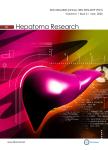Reducing liver cancer risk beginning at birth:experiences of preventing chronic hepatitis B virus infection in China
Reducing liver cancer risk beginning at birth:experiences of preventing chronic hepatitis B virus infection in China作者机构:Department of ImmunologyNational Cancer Center/Cancer HospitalChinese Academy of Medical Sciences and Peking Union Medical CollegeBeijing100021China State Key Laboratory of Molecular OncologyNational Cancer Center/Cancer HospitalChinese Academy of Medical Sciences and Peking Union MedicalCollegeBeijing100021China Artificial Liver CenterBeijing YouAn HospitalCapital Medical UniversityBeijing100069China.
出 版 物:《Hepatoma Research》 (肝癌研究(英文版))
年 卷 期:2017年第3卷第10期
页 面:228-240页
学科分类:1002[医学-临床医学] 100214[医学-肿瘤学] 10[医学]
基 金:The study is supported by: State Key Projects Specialized on Infectious Diseases, No. 2017ZX10201201-006-003, to CQ Key research projects for precision medicine, No. 2017YFC0908103, to CQ State Key Projects Specialized on Infectious Diseases, No. 2017ZX10201201, to ZD Beijing Municipal Science& Technology Commission, No. Z151100003915096 and No. Z16110000516084, to HZ
主 题:Hepatocellular carcinoma prevention vaccination antiviral therapy adolescent vaccine boost
摘 要:In China, the death numbers due to primary liver cancer every year account for more than half of this disease burden worldwide. Hepatocellular carcinoma (HCC) represents the major histological type of primary liver cancer. In the Chinese population, at least 85% HCC cases are due to chronic infection with hepatitis B virus (HBV), most of which were acquired in the perinatal period or in early life. As of January 1992, HBV immunization of newborns was introduced to the national Expended Program of Immunization of China. Prior to this program, the Qidong County in China conducted an hepatitis B intervention study, which was a population-based, cluster randomized, controlled trial of HBV vaccination in neonates. The study demonstrated that among young adults 30 years old, neonatal HBV immunization decreased around 84% risk of HBV-related liver cancer, and 70% risk of mortality due to severe end-stage chronic liver diseases. More than 72% efficacy of neonatal vaccination against chronic HBV infection in adulthood was achieved;however, when catch-up HBV vaccination was given to children at age 10-14 years, the protection efficacy was only 21%. No difference in mortality of HBV-related liver diseases was observed among the young adults 30 years who received and those who did not receive the catch-up HBV vaccination. These results highlight the crucial importance of HBV vaccination of neonates in reducing the liver cancer risk beginning at birth in highly HBV endemic regions. Due to large numbers of HBV-infected pregnant women with high viremia in China, clinical studies in which antiviral therapy with the nucleot(s)ide analogues was given to HBV-infected pregnant women have provided important evidence that such therapy can reduce the risk of mother-to-child HBV transmission. These clinical data based on cohort studies, randomized clinical trials, and clinical practices in the Chinese population provide important information on prevention of liver cancer, particularly



